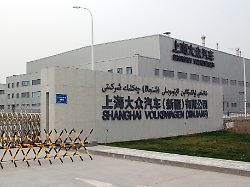“No Forced Labor”
VW China boss travels to factory in Uyghur province
02/28/2023 3:23 p.m
After revelations about the widespread oppression of Uyghurs in the Chinese province of Xinjiang, VW has to justify its controversial factory. China boss Brandstätter travels there personally and cannot find anything problematic.
The Volkswagen Group wants to stick to the site even after a visit by its China board member Ralf Brandstätter to the controversial plant in the Xinjiang region. “Of course we are aware of the critical reports, we take it very seriously,” said the manager, commenting on reports that there was systematic oppression of Muslim Uyghurs in the western province. “But we have no evidence of human rights violations in this plant – that hasn’t changed after my visit.”
Brandstätter traveled to the city of Ürümqi for two days in mid-February to look around the local factory. “I didn’t find any contradictions,” said Volkswagen’s China boss. “I have no reason to doubt the information and my impressions. Regardless of that, of course we’re still looking.” A report by the UN High Commissioner for Human Rights last year spoke of serious violations in the area.
According to some non-governmental organizations, serious violations of elementary rights have been documented – for example, there are said to be re-education camps in which Uyghurs are mistreated. “We are indeed deeply concerned by the finding in this report and have looked at it very carefully,” said VW’s head of external relations, Thomas Steg. “We have never ignored the situation or taken it lightly, but have repeatedly made it clear that the Volkswagen Group does not tolerate forced labor or other forms of discrimination.”
China’s market essential for VW
International criticism of the situation in Xinjiang repeatedly puts the Wolfsburg-based company – like other companies with China business – in need of explanation. VW Group sales in the People’s Republic fell by 3.6 percent in 2022, mainly due to new Covid lockdowns. Overall, however, the country remains an indispensable market for the largest German company. The almost 3.2 million Group vehicles sold there accounted for more than 38 percent of all vehicles delivered worldwide.
One has only limited control options in Ürümqi because a subsidiary of the joint venture, which is not controlled by Volkswagen, operates the plant with the Chinese partner SAIC, Steg explained: “Decisions can only be made by mutual agreement – there are existing contracts. Agree with our partner SAIC we agree that fundamental values and the law must be respected and protected in joint undertakings.” The factory project, which started in 2012, was interesting because the demand for cars in the structurally weak region was estimated to be high. According to Steg, the climate has changed over time – also because the policy of the Beijing government in the autonomous Uyghur region has changed after a terrorist attack, for example.
Detailed tour of the factory
Brandstätter described his own picture: “The plant is no different from other plants of the joint venture companies in China. I got to know a committed team. A good working atmosphere is ensured, also through targeted integration measures. In addition, there is obviously great importance to a good get-together.” He took over the post of China chief last summer.
At present, VW and SAIC do not produce their own vehicles in Ürümqi, but technically put into operation vehicles supplied from other factories. According to Brandstätter, by 2023 there will be around 10,000 units, which will then be distributed to regional dealers. Almost 240 employees are currently working at the site – significantly fewer than before the Corona crisis.
Brandstätter said he took a detailed tour of the plant. There was also a longer conversation with seven employees – among them Uyghurs and representatives of other groups such as Kazakhs and Han Chinese. In some cases, they were also able to communicate in English. Government or administration representatives were not present. 29 percent of the employees in Ürümqi belong to minorities, 17 percent are Uyghurs. “The various population groups are roughly equally distributed across production, technical professions and management.”
VW works council is putting pressure on
According to data from the partner SAIC, three quarters of the employees have been employed there for eight years or more. The VW works council emphasized that a formal lack of direct action on the processes in the plant “does not release the group from confronting the issues and actively positioning them”. In general, the issue of human rights in China is viewed with great concern. “The facts that the world community has in this regard about Xinjiang are unmistakable,” said the employee representative in Wolfsburg. According to Steg, the existing contracts with SAIC there will run until the early 2030s. “And we gather from the talks with SAIC that the partner does not question the work.” China remains a key sales market and technology driver for VW.
A realignment of the German government’s China policy could also have consequences for German investments. Economics Minister Robert Habeck had stated that federal guarantees would be carefully examined with a view to environmental, social and human rights aspects. “Yes, there was a decision not to grant applications for the extension of guarantees,” said Steg. “But it wasn’t about investing in Xinjiang.”
